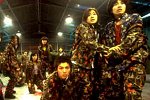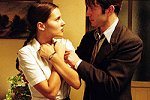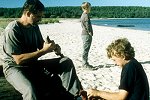 SHADOWS ARTHOUSE FILMS 04
SHADOWS ARTHOUSE FILMS 04On this page: ALL TOMORROW'S PARTIES | BATTLE ROYALE II | BON VOYAGE |
THE RETURN | SPRING SUMMER AUTUMN WINTER ... AND SPRING
< < M O R E | M O R E > >
More mainstream art films have their own pages.
Other offbeat films are at: SHADOWS FILM FESTIVAL | FESTIVAL SHORTS
last update
2.Mar.04
 ALL TOMORROWS PARTIES
ALL TOMORROWS PARTIES

|
dir-scr Yu Lik-Wai with Cho Yong-Won, Diao Yi-Nan, Zhao Wei-Wei, Na Ren release UK 2,Apr.04 03/China 1h36  REVIEW BY RICH CLINE |
Writer-director Yu captures the desolated Chinese landscape beautifully--the film's washed-out/shadowy look is reminiscent of 1970s sci-fi classics like Mad Max, THX-1138 and A Boy and His Dog. He also cleverly builds the eerie atmosphere with a real sense of disorientation and longing for both order and compassion. But this muted, low-key approach also makes it hard for us to go along with it, as do otherworldly sequences and a maddeningly loose approach to narrative and characterisation. Who people are or what's going on is anyone's guess! Sure, the long takes, underwritten script and subtle approach are elegant and clever, but there's so little for us to grasp that we just drift along bewildered by what's on-screen. It only springs to life during brief moments of humour or romance, such as when Zhuai and Xuelan playfully sniff each others' perfume in a sweet and sexy mating dance, or a fantasy sequence involving a room full of screaming girls. And ultimately it's well worth seeing for its glimpse of hope in the hearts of the very last dregs of human society. [15 themes, language, violence, imagery] 12.Feb.04
 BATTLE ROYALE II: REQUIEM
BATTLE ROYALE II: REQUIEM

|
dir Kinji Fukasaku, Kenta Fukasaku scr Kenta Fukasaku with Tatsuya Fujiwara, Ai Maeda, Shugo Oshinari, Takeuchi Riki, Ayana Sakai, Haruka Suenaga, Yuma Ishigaki, Miyuki Kanbe, Masaya Kikawada, Aki Maeda, Sonny Chiba, Beat Takeshi release Japan 5.Jul.03, UK 23.Aug.04 dvd 03/Japan 2h13  See also: BATTLE ROYALE (2000) REVIEW BY RICH CLINE |
Three years later, Japanese society is descending into even deeper chaos with a group of teen terrorists declaring all-out war against the adults who devised the Battle Royale system to weed out kids by forcing them to fight to the death. So the government replies by passing a BRII law, and now a classroom of 15-year-olds is forced to go after the terrorists! There are lots of little hitches, such as the fact that the teens are paired together so if one dies, the other is instantly killed by his or her murderous neck-cuff. Of course, once they get to the remote island hideout of the terrorist leader (Fujiwara, survivor of the first film), these kids switch sides and an all-out bloodbath ensues.
Part 1 was bad enough, but this film has even less logical coherence or thematic resonance. It's also nearly pornographically preachy, laying the anti-American sentiment on so thickly that it completely undermines the film's rather provocative message. There's a thoroughly immature attempt on the part of the filmmakers to overlay America's War on Terrorism into the story. But it completely undermines the message. Technically, there are some scenes that look fantastic, while others are shockingly amateurish. Perhaps this shows what was filmed by Japanese moviemaster Kinji, who died during production; his son Kenta finished the film. Or maybe it was ill-conceived from the get-go. The vicious slaughter pauses awkwardly for moments of contrived weepiness and straight-to-camera lectures. The acting is pretty terrible throughout, most notably wild overplaying by the teacher (Riki) overseeing the "game". Some of the teens fare a bit better, but not many. This film is an assault to the senses, which is a pity because the themes are worth discussing. But after seeing this film you won't want to! [18 strong violence and gore, language] 17.Feb.04
 BON VOYAGE
BON VOYAGE

|
dir Jean-Paul Rappeneau scr Jean-Paul Rappeneau, Patrick Modiano with Isabelle Adjani, Gregori Derangere, Gerard Depardieu, Virginie Ledoyen, Yvan Attal, Peter Coyote, Jean-Marc Stehle, Aurore Clement, Edith Scob, Xavier De Guillebon, Michel Vuillermoz, Nicolas Vaude release France 16.Apr.03, US 19.Mar.04, UK 14.May.04 03/France 1h54  REVIEW BY RICH CLINE |
Viviane (Adjani) is a famous actress in 1940 Paris, with a stream of admirers including her long-time friend Frederic (Derangere). She's used to men doing extraordinary things for her, but when she asks Frederic for help, he ends up in jail for his efforts. As the Germans invade the country, he escapes and catches up with Viviane in Bordeaux, where she's cleverly taken up with a government minister (Depardieu). Frederic also encounters a another escapee (Attal) and young activist (Ledoyen) who's trying to help a professor (Stehle) smuggle a military secret out of the country before the Germans get it. Both Viviane and Frederic have to juggle all these elements, avoid a tenacious journalist (Coyote) who's obviously hiding something, and decide who they'll end up with.
Rappeneau (Cyrano de Bergerac) has such an amazing attention to detail that everything springs to life beautifully-- sets and scenery, characters and action scenes. It's expert filmmaking full of terrific suspense, romance, humour and melodrama, structured like a classic farce with coincidences everywhere and moments of pure comedy and surprising emotion. Derangere is excellent at the centre, the innocent man caught in a whirlwind of chaos as he tries to clear his name and get the girl (but which girl?), while the wonderful Adjani and Ledoyen swirl around him--one a vain drama queen and the other an intense idealist. The bustling structure keeps us gripped, even though there's too much going on, brushing quickly past historical events and relying on our knowledge of the situation to understand what's happening on the larger scale. The humour is also a little too knowing--I'm sure the film is far funnier for French audiences! But it's so well-made that we can't help but love it. [12 themes, violence] 10.Feb.04
 THE RETURN
THE RETURN

|
dir Andrei Zvyagintsev scr Vladimir Moiseyenko, Aleksandr Novototsky with Vladimir Garin, Ivan Dobronravov, Konstantin Lavronenko, Natalya Vdovina, Galina Petrova release US 6.Feb.04; UK 25.Jun.04 03/Russia 1h55  REVIEW BY RICH CLINE |
Mikhail Krichman's cinematography is absolutely stunning, and Zvyagintsev directs the film cleverly, drawing us into the story through the tentative boys' very distinct personalities. Throughout their odyssey, these three very different men circle each other trying to find a chink in the armour. The acting is never obvious or strained, gently opening up the characters for us (but not necessarily for each other). The late Garin is excellent as the more open, eager-to-please Andrei, while Lavronenko's performance has just the right mixture of charisma and mystery. But Dobronravov owns the film as the surly, demanding, emotional Ivan, which admittedly is the film's most colourful role. Along with Ivan, we know Dad's up to something and that tragedy may strike at any minute. But the facts are eerily enigmatic and untouchable. In this way, Zvyagintsev gets us right into the story; we feel a sense of foreboding along with the boys, but we're so entranced by this mysterious man that we willingly dive in. And the result is devastatingly powerful! Remarkable, challenging filmmaking. [15 themes, violence, language] 4.Mar.04
Winner: Golden Lion, 2003 Venice Film Festival
 SPRING SUMMER AUTUMN WINTER ... AND SPRING
SPRING SUMMER AUTUMN WINTER ... AND SPRING

|
dir-scr Kim Ki-duk with Oh Young-soo, Kim Jong-ho, Seo Jae-kyeong, Ha Yeo-jin, Kim Young-min, Ji Dae-han, Kim Ki-duk, Park Ji-a release Korea 19.Sep.03, UK 14.May.04 03/Korea 1h43  REVIEW BY RICH CLINE |
Even without any knowledge of Buddhist symbolism, this is a striking film to watch, full of evocative imagery and provocative themes. From the complex use of animals and plants to the geographic setting and astonishing floating set, this is masterful filmmaking on every level, complete with performances that are almost frighteningly believable. Most of the film is virtually silent, like Kim's eerie thriller The Isle (2000), which was also set in a floating cabin. But there's no need for dialog when the characters are interacting so meaningfully with each other and with nature, captured with breathtaking cinematography that seems to effortlessly show both the grandeur of the landscape and the inner soul of the characters. Some scenes are hilarious, while others are sexy, sweet, frightening or shocking. But it all means something, and even if we aren't equipped to decode the symbolism, it still speaks eloquently. This is a magical, engaging story that's never dull for a second. Like the old master, Kim is subtly teaching us about fortitude, forgiveness, penitence, selflessness and balance in such a way that we're hardly aware he's doing it. Beautiful. [15 themes, sex, some violence] 1.Mar.04
